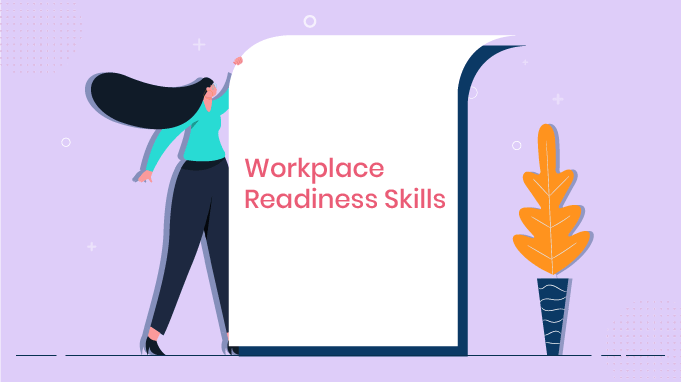Mastering Workplace Readiness Skills For Organizational Success
Workplace readiness skills refer to the qualities that employers look for in employees. It is a combination of attributes and behaviors that will make employers hire a candidate. They are also called soft skills, employment ability skills, or job readiness skills.
These skills help employees know how to cope with managers and coworkers. They help enhance the value of timeliness and develop an awareness of how others view us. Workplace readiness skills ensure that employees have the academic, critical thinking, and personal skills required to keep their jobs. Again, the capability of workers to think and make sound choices is essential.
Benefits Of Workplace Readiness Skills
Employers prefer applicants who show the ability to perform the required skills. They trust workers who can interact easily and behave professionally. Apart from technical skills, good social skills are inevitable in any job role.
Workplace readiness applicants are employable because they make healthy decisions. They can learn new skills and adapt to different work circumstances.
Besides, employees who are punctual and have good work ethics have higher demand. They know how to appreciate their colleagues and supervisors.
Employers who recruit skilled staff realize productivity improvement. It is because they perform their jobs correctly, complete work on time, and meet the business's goals and objectives
Hiring trained employees often reduce employee turnover, as they perceive opportunities for promotion.
Also read: Employee Promotion: The Types, Benefits, & Whom to Promote
Workplace Readiness Skills For 2022
The Virginia Department of Education updated the Workplace Readiness Skills for the Commonwealth. The Weldon Cooper Center co-operated their research.
It introduced two new skills. They are initiative and self-direction and information literacy.
Information technology is now combined with telecommunications. The result is 22 competencies in three areas. They are personal qualities and abilities, inter-personal skills, and professional capabilities.
Personal qualities and abilities
-
Creativity and innovation.
Employees should use originality, inventiveness, and resourcefulness at work. -
Critical thinking and problem-solving.
Employees should use sound logic to analyze challenges. They must assess possible solutions and execute the appropriate action. -
Initiative and self-direction.
Employees should individually search for ways to strengthen the workforce and achieve tasks. -
Integrity.
They should follow the laws, procedures, and regulations in the workplace. It will help them exhibit fairness, equity, and respect. -
Work ethic.
Workers should be able to operate reliably to the best of their ability. They should be vigilant, efficient, and responsible for their actions.
Interpersonal Skills
-
Conflict resolution.
Employees should be able to negotiate interpersonal and workplace problems with diplomatic solutions. -
Listening and speaking.
They should listen and asks questions to clarify the purpose. They are also expected to articulate ideas in a manner suitable for the environment. -
Respect for diversity.
Workers should value individual differences. They should work with people of different cultures, opinions, and experiences in partnership. -
Customer service orientation
They should deliver thoughtful, courteous, and professional service, meeting the client’s needs. -
Teamwork.
Employees must be accountable for their actions. They should acknowledge the views, perspectives, and contributions of team members.
Professional Competencies
-
Big picture thinking.
They should recognize their role in fulfilling the workplace's mission. They must take the social, economic, and environmental consequences of their behavior into account. -
Career and life management.
They should plan and execute their education, career, finances, and health-related personal and professional growth objectives. -
Continuous learning and ability to adapt.
Employees must embrace positive feedback and should be open to new ideas. They should develop technical skills and expertise to respond to evolving job demands. -
Efficiency and productivity.
They should plan, focus on, and adjust work objectives to control time and resources. -
Information literacy.
They must locate information, assesses the reliability and validity of sources and facts. They should use this information to conduct work-related tasks. -
Information security.
They should understand essential internet protection and follow protocols in the workplace. It is to protect information, devices, networks, and facilities. -
Information technology.
Employees should continue to maintain a working knowledge of a variety of things. It includes devices, tools, hardware, software, systems, apps, and IT. -
Job-specific tools and techniques.
They should know how to choose industry-specific technology, equipment, and machines. They should use them safely to complete job tasks. -
Mathematics.
They should be able to put in mathematical skills in place to complete tasks, as needed. -
Professionalism.
They should meet the expected standards of work schedule, behavior, and communication. -
Reading and writing.
They must be able to read, write, and interpret official documents. -
Workplace safety.
Employees should create a healthy working atmosphere by compliance with safety standards. And be able to detect threats to oneself and others.
Recruiters are in the rat race of getting the most highly qualified applicants. They often forget that the highest grades do not mean that the applicant will be the best.
Good applicants need to have the above fundamental skills and the right mindset to complement educational qualifications and professional accomplishments. It would ensure that they work fruitfully with their teammates and are successful with the business.
This is why skill assessments are conducted. Applicants or candidates are often required to take written and oral tests to help HRs.
If you’re the HR manager, you can check a person’s workplace readiness skills with specific tricky questions.
Sample Test Questions To Assess Workplace Readiness Skills
Question 1.
You work for a graphic design company. You usually get off at 5 in the evening. Your team is working on a big project, and to reach a deadline, your team leader asks you to remain late. Previously that day, you agreed to accompany a neighbor to a major appointment at 6:30 p.m. What are you going to do?
Answer-
A. Call a friend who knows your neighbor to see if he/she can carry your neighbor to the appointment, and stay until the project is over.
B. Ignore your neighbor and stay at work because it is more important.
C. Tell your colleague that you cannot stay and why, because you first committed yourself to support your neighbor.
D. Try to complete your work by 6 p.m and then try to take your neighbor to the 6:30 p.m. appointment.
Question 2.
On Tuesday, your manager asks you to work on three projects that need to be completed by Friday. On Wednesday, you realize that you will not be able to complete them on time. What should you do?
Answer-
A. Discuss the problem with your manager.
B. Come in early to work to complete the projects on time.
C. Ask coworkers to help you out.
D. Finish what you can; deadlines hardly matter.
Question 3.
Which of the following phrases is the best for a formal greeting during a presentation?
Answer-
A. Be seated.
B. Let’s get started.
C. Listen up.
D. Welcome.
Final Words.
As HR managers, we must also play a significant role in providing young people with opportunities to develop the skills they require. Organizations should partner with other workplaces that collaborate to offer young people internships, skill training, and summer jobs. Also, we should inspire our employees to function as mentors and tutors. We should participate in local and national level projects that have proven their potential to boost young people's outcomes.

















